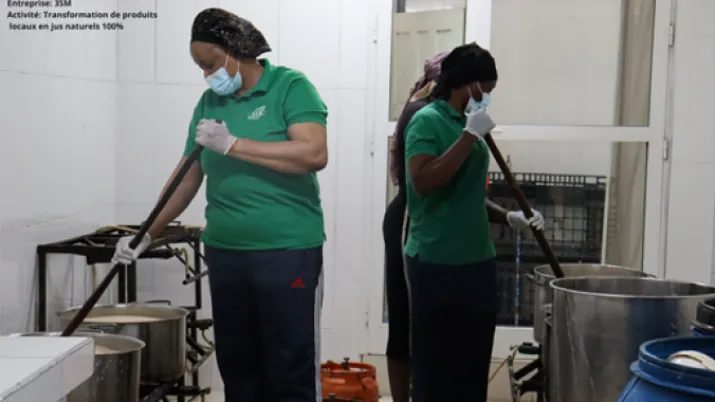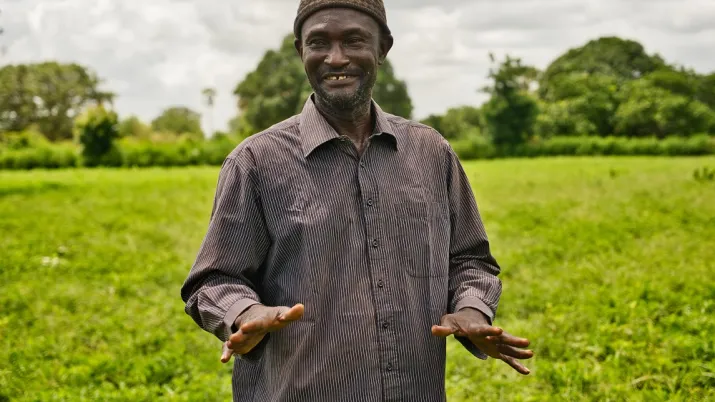Share the page
ACEP Sénégal: how microfinance is boosting small players in the agri-business sector
Published on
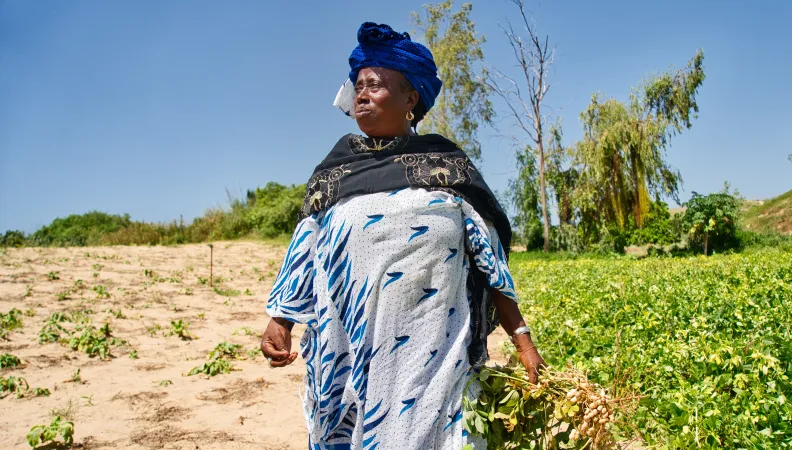
For over 30 years, ACEP Sénégal has been partnering small players in the agri-food sector by facilitating access to financial services. Its presence throughout Senegal, working alongside the rural population, make it a key player in microfinance. ACEP Sénégal has recently been granted a €10 million loan by Proparco, helping it to meet two key challenges: food sovereignty and the financial inclusion of women.
According to the Food and Agriculture Organisation of the United Nations, almost 30% of the Senegalese population is currently experiencing moderate or significant food insecurity. But agriculture represents a key economic growth driver for Senegal: the sector generates over 17% of GDP and employs 22% of the active population. Supporting players in the agri-food sector – both small and industrial producers – is a priority for strengthening the economic fabric and meeting the challenge of food sovereignty.
This support for agri-business is central to the mission of ACEP Sénégal, which emerged in Kaolack, capital of the country's groundnut producing basin, with the aim of supporting small rural businesses. Originally set up in 1986 to tackle food insecurity, ACEP Sénégal became a savings and credit union in 1994 and currently heads up a network of 11 affiliated credit unions.
Small producers – an essential link in the agri-food chain
ACEP Sénégal plays a key role in promoting enterprise and developing small agricultural businesses. Through its actions, the microfinance institution promotes the economic inclusion of people who have traditionally been excluded from financing circuits. As CEO Souleymane Sarr explains: “Our customers are tradespeople, female entrepreneurs and small agricultural producers who, because of their financial fragility, are hit even harder by various economic, climate and political crises.”
While the institution primarily targets small producers, the mainstay of the local economy, it also deploys a strategy that covers the entire agri-food value chain. Mamadou Dialigue Dieng, Head of Treasury, ACEP Sénégal, adds that “Our agriculture portfolio covers all of the players: small producers, producer groups, village organisations and industrial players involved in agricultural processing.” By covering the entire sector – from production to marketing – the institution strengthens the long-term resilience of local agri-businesses.
Testimony of Sokhna Mada Ndong, vegetable grower
As Sokhna Mada Ndong tells us with a smile, “I grow potatoes, groundnuts, turnips, carrots, lemons and papayas.” Sitting in her two-hectare field in Kayar, a coastal town north of Dakar, this 57-year-old vegetable grower tells us how ACEP Sénégal provided the support she needed to grow her business.
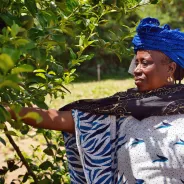
In addition to this plot of land, she farms another six-hectare plot. “The best help a worker can ask for is money when they need it”, she explains. Climate hazards have transformed Senegal's agricultural sector in recent years: “We now have to grow twice as much as before to make up for losses”, she says, pointing to a crop of unsaleable scorched turnips. The institution's added value is based on loan arrangements adapted to the constraints that farmers have to contend with. Sokhna Mada Ndong reiterates that “Without ACEP Sénégal, I could have continued to work, but I wouldn't have achieved these results. Their approach – with flexible repayments – is a great help in the precious work of agriculture, where you only reap what you sow!”
Working closely alongside rural populations
With 90 branches across the country, ACEP Sénégal works really closely with rural populations. And as Souleymane Sarr explains, this footprint in the most remote areas is reinforced by a high degree of operational mobility. “150 portfolio managers, equipped with appropriate means of transport, such as off-road motorbikes, canvass and structure loan applications, even in areas where we do not actually have a physical presence.” Geographical proximity facilitates a better understanding of needs and strengthens the bond of trust between the institution and people unfamiliar with financial services.
This approach to financial inclusion is supported by ACEP Senegal's credit union model, which involves its 320,000 customer members in decision-making, encouraging the integration of local players while preserving their autonomy.
The microfinance institution has also developed online services to make it easier to access its financial products. As Mamadou Dialigue Dieng points out, “We’ve developed an app, SAMA ACEP, together with innovative services like Bank to Wallet, to transfer money from a bank account to a mobile wallet.” ACEP Sénégal has also developed a credit scoring application to assess customer creditworthiness and fine-tune its offers.
Testimony of Ibrahima Thiam, farmer
Ibrahima Thiam farms 15 hectares of land in Keur Madiabel, a few kilometres from Kaolack. He tells us that, “I've been farming since I was a child. I started when I was 12, accompanying my father, and today I still farm the same land.”
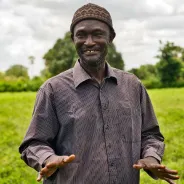
He has been partnered by ACEP Sénégal for over 15 years and he stresses the quality of the partnership: “The experience I've had with ACEP Sénégal is one I've never had with any other bank. It's a bank that respects its customers.” Accompanied by Kaolack Branch manager, Arouna Ka, to whom he is showing his latest maize crop, the farmer talks about the tailored individualised follow-up the institution provides for its customers: “When problems arise, ACEP Sénégal teams come out and take the time to understand the situation and find rapid solutions on favourable terms.” This professional support also provides him with stability day to day: “My family expenses are covered and I can pay for my own healthcare and that of my family if necessary.”
Financial inclusion of women is also a key issue for the agricultural sector
In Senegal, although women do most jobs in the agricultural sector, they face specific obstacles, including limited access to land, finance and equipment, hampering their entrepreneurial capacity (Le Monde, 2022). The loan granted by Proparco to ACEP Sénégal aims to foster female entrepreneurship in the agri-food sector. Although 50% of the institution's customers are women, loans granted to them represent only 30% of financing volumes, a figure that should rise to 45% by 2026 thanks to the agreement with Proparco.
To facilitate access to entrepreneurial opportunities, the microfinance institution has developed products specially adapted for women, including loans for Income-Generating Activities (IGAs) that require little financing, support with setting up groups of borrowers and simplified guarantee arrangements. “We allow women to pledge any type of equipment as collateral, regardless of its quality or value”, explains the CEO.
Testimony of Fatou Diop, who processes fish
Orders from the port, preparing the ovens, smoking, drying, storing and selling – Fatou Diop describes each stage of fish processing in detail. In Joal Fadiouth, 130 km south of Dakar, fishing is a real economic vector. Fatou Diop belongs to a group of four women.
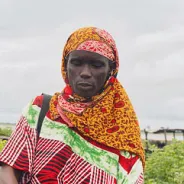
She has been granted a loan to grow her business: “ACEP Sénégal really helps women here”, she says. Standing in a huge marshy field dotted with storage sheds, ovens and drying sheds, Fatou Diop talks about the support provided by the microfinance institution: “Before, I could only produce between 10 and 20 cases of smoked fish a day but today I produce up to 40 cases. I only started working with ACEP Sénégal this year, but I can already see the benefits.”
ACEP Sénégal – microfinance supported by Proparco
Proparco's funding will help boost the microfinance institution's lending to small players, producers and entrepreneurs across the agri-food chain. As Souleymane Sarr explains, “In our 2024-2026 business plan, we plan to increase the proportion of financing earmarked for the agri-food sector from 10% to 20%.” The line of credit should also generate almost 7,500 jobs and provide support for nearly 2,300 micro and medium-sized enterprises (MSMEs), half of them in the agricultural sector and owned or run primarily by women.
Through this financing, Proparco is boosting economic opportunities and the resilience of local economic systems in favour of a sustainable and resilient economy, and helping to reduce gender inequalities, two major focuses of its 2023-2027 strategy.
This operation is in phase with the Food & Agriculture Resilience Mission (FARM), launched in 2022 by Emmanuel Macron, President of France, alongside the European Union, the G7 and the African Union. FARM aims to strengthen food security in the most vulnerable countries.
Key figures
- 11 affiliated credit unions
- 320,000 customer members
To find out more
Private Sector & Development #39 - Food security: the contribution of the private sector
Published on October 16, 2023
ACEP Senegal contributes to Senegal's food sovereignty with an agricultural microfinance solution
Published on August 20, 2024


